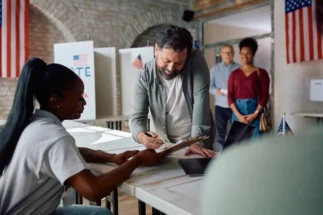From Chaos to Control: 3 Ways to Simplify Election Season Social Media
Elections are already a busy time for local governments, especially regarding social media. Here’s how the right technology can bring efficiency.
In today’s digital age, social media is one of the first places your community will turn to for information and updates from their government, especially during a politically charged election season. With artificial intelligence (AI) technologies more prevalent than ever and misinformation rampant in the lead-up to elections, ensuring your processes allow little room for error is important.
Whether you’re looking at a major presidential election (hint: November) or one that’s more local, the election season influx sneaks up and inflicts chaos more often than not. Even if your social media approach is to stay dark, it’s guaranteed that attention will find its way to your profiles. 91% of those surveyed in our 2022 study indicated that social media is used for citizen engagement, and 73% expressed concern over managing controversial topics (up 57% from 2021).
Open and accessible social media doesn’t come without its challenges, though, and managing public records — such as Instagram content — to ensure compliance with Freedom of Information Act (FOIA) laws is critical. Take charge of your role in compliance and public information sharing by understanding what you can do to prepare and how social media archiving software can help. Here are three ways this critical technology can increase trust and decrease stress.
1. Comply with public records laws
A polarized political climate often turns comment sections into battlegrounds, with public communicators caught in the middle. Figuring out how best to referee heated discussions while being mindful of First Amendment restrictions and public records laws can be tough. Because of this, keeping accurate records is imperative. Furthermore, it’s been reported that public records requests have continued to spike since the 2020 election.
Thanks to the FOIA and records laws in states across the U.S., residents are entitled to a vast amount of government information and records. These records include electronic communication and encompass all social media posts. With automated social media archiving software, you and your team will be best positioned to ensure compliance with these laws and respond swiftly to the large volume of requests.
For more information, revisit our deep dive on social media and public records.
2. Maximize community participation
Campaigns like “Get out the vote” (#GOTV) and others that target voter education are now a social media mainstay — and for good reason. Social media is a great way to engage your community, especially a younger demographic, and is a natural platform to amplify key messaging and make the increased attention you receive during elections matter.
Whether your team takes a light-touch approach, as in the story below on U.S. Representative Alexandria Ocasio-Cortez’s use of Instagram, or aims for more serious communications, make sure you know where your target audience is most active so you are poised to capitalize on the heightened scrutiny positively by bringing your community together and keeping them abreast of the most essential, need-to-know information.
Archiving technology can help facilitate conversations and capture the context for any social media record. From managing blocked lists and aiding social listening to risk mitigation through alerts and analytics, a solid archive can eliminate disjointed conversations and export conversations or specific comments exactly as they happen (and in only a few clicks).
If you and your team need clarification on social media rules and regulations on platforms like X and TikTok, check out this helpful guide from Hootsuite.
3. Maintain content authenticity
According to the Mozilla Foundation, 2024 will be “the ultimate election year” for transparency and trust. This does not come as a shock, given how social media usage during elections has continued to skyrocket since the campaigns of the 2008 cycle. The social media landscape has changed drastically and shows no signs of stopping.
While deepfake videos, AI-generated or modified images, and other forms of information manipulation are more common on the national scale, local government agencies are not immune. Social media archiving – whether for Facebook, YouTube, or other networks – is one way to ensure an accurate, referenceable record of your agency’s social media activity is available at a moment’s notice for your residents and your agency teams.
After all, among adults under age 49, Pew Research Center data shows that Americans are beginning to trust information from social media sites nearly as much as that from national and local news organizations.
In conclusion, the need for social media archiving is nonnegotiable, and anyone representing a local government will be subject to compliance with public records laws. Moreover, the impact that an election can and will have on social media surrounding when you’re posting and how you’re sharing information is vital to understand and manage accordingly. It is essential to be prepared and have processes for moderating, reviewing, and storing social media posts.
If you’re not already set up to efficiently manage your social media content, get started today with a free 30-day trial of CivicPlus® Social Media Archiving software to sample your archive. Not quite sure if it’s right for you? Contact us to speak with a representative and learn more.
Related reads:
Social Media, Public Records, and FOIA
Prepare for Election Season and a Spike in Public Records Requests
Still Have Questions?
Our experts are ready to help your local government during this election season.


